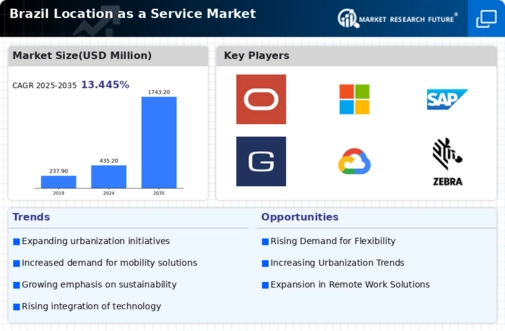Rising Demand for Real-Time Location Data
The location as-a-service market in Brazil experiences a notable surge in demand for real-time location data. This trend is driven by various sectors, including logistics, retail, and transportation, which increasingly rely on accurate location information to enhance operational efficiency. For instance, the logistics sector, which contributes significantly to Brazil's GDP, is projected to grow by approximately 10% annually, necessitating advanced location services. Companies are leveraging location data to optimize routes, reduce delivery times, and improve customer satisfaction. Furthermore, the integration of real-time data analytics into business operations is becoming essential, as organizations seek to make informed decisions based on precise location insights. This growing reliance on real-time data is likely to propel the location as-a-service market forward, as businesses recognize the value of location intelligence in driving competitive advantage.
Growth of E-Commerce and Delivery Services
The rapid expansion of e-commerce in Brazil significantly influences the location as-a-service market. With online retail sales projected to reach $30 billion by 2025, businesses are increasingly adopting location-based services to streamline logistics and enhance customer experiences. Delivery services, in particular, are leveraging location data to optimize routes and reduce operational costs. The competitive landscape in the e-commerce sector necessitates efficient delivery mechanisms, prompting companies to invest in location technologies. This trend is further supported by the rising consumer expectation for fast and reliable delivery options. As e-commerce continues to flourish, the location as-a-service market is poised for substantial growth, driven by the need for innovative solutions that cater to the demands of modern consumers.
Government Support for Digital Infrastructure
Brazil's government is actively promoting the development of digital infrastructure, which plays a crucial role in the growth of the location as-a-service market. Initiatives aimed at enhancing connectivity and expanding broadband access are underway, with investments reaching approximately $1 billion in recent years. This investment is expected to facilitate the deployment of advanced location-based services across various sectors, including healthcare, transportation, and urban planning. The government's commitment to fostering a digital economy aligns with the increasing demand for location services, as businesses and municipalities seek to leverage technology for improved service delivery. As digital infrastructure continues to evolve, the location as-a-service market is likely to benefit from enhanced capabilities and broader adoption of location-based solutions.
Increased Urbanization and Smart City Development
Brazil is witnessing a significant trend towards urbanization, with over 85% of its population expected to reside in urban areas by 2030. This urban shift is driving the development of smart cities, which rely heavily on location-based services to enhance urban management and improve quality of life. The location as-a-service market is likely to play a pivotal role in this transformation, as municipalities seek to implement smart solutions for traffic management, public safety, and resource allocation. Investments in smart city initiatives are projected to exceed $10 billion in the coming years, creating opportunities for location service providers to collaborate with local governments. As urban areas become more interconnected, the demand for location services is expected to rise, further propelling the growth of the location as-a-service market.
Emergence of Advanced Analytics and IoT Integration
The integration of advanced analytics and the Internet of Things (IoT) is reshaping the landscape of the location as-a-service market in Brazil. As IoT devices proliferate, the ability to collect and analyze location data in real-time becomes increasingly feasible. This technological advancement allows businesses to gain deeper insights into consumer behavior and operational efficiency. For instance, retail establishments are utilizing IoT-enabled location services to track foot traffic and optimize store layouts, potentially increasing sales by up to 15%. The convergence of analytics and location services is likely to enhance decision-making processes across various industries, driving demand for innovative solutions. As organizations recognize the value of data-driven insights, the location as-a-service market is expected to expand, fueled by the growing adoption of IoT technologies.
















